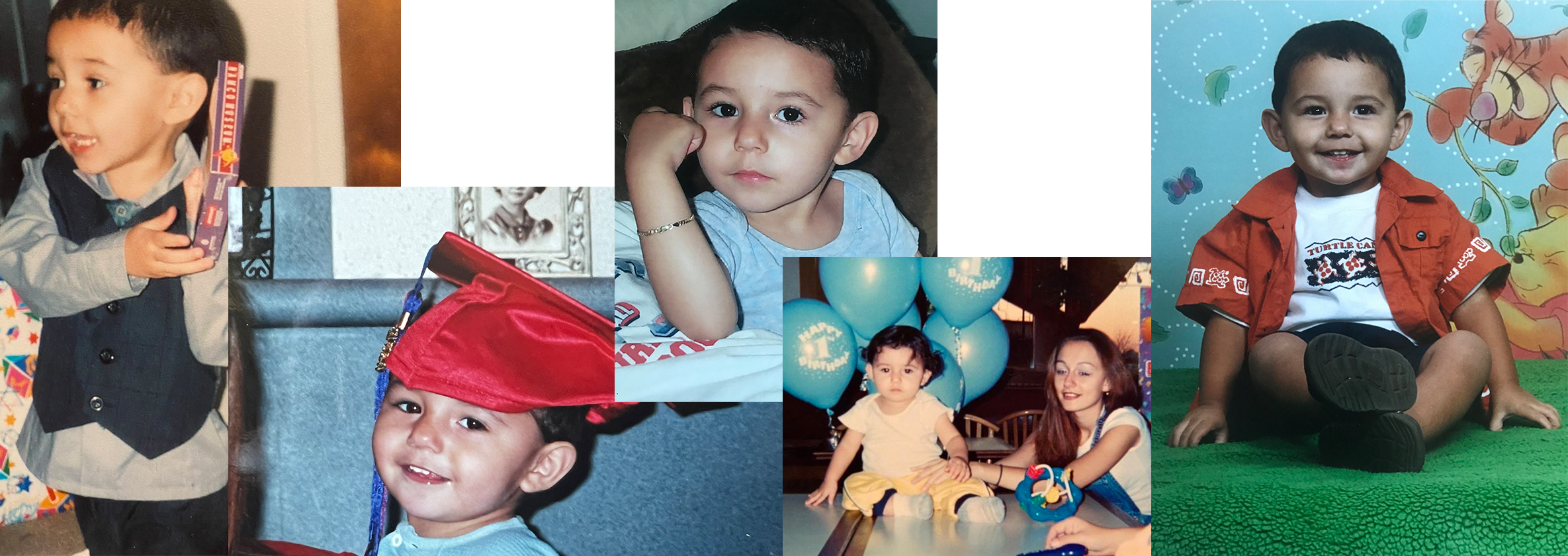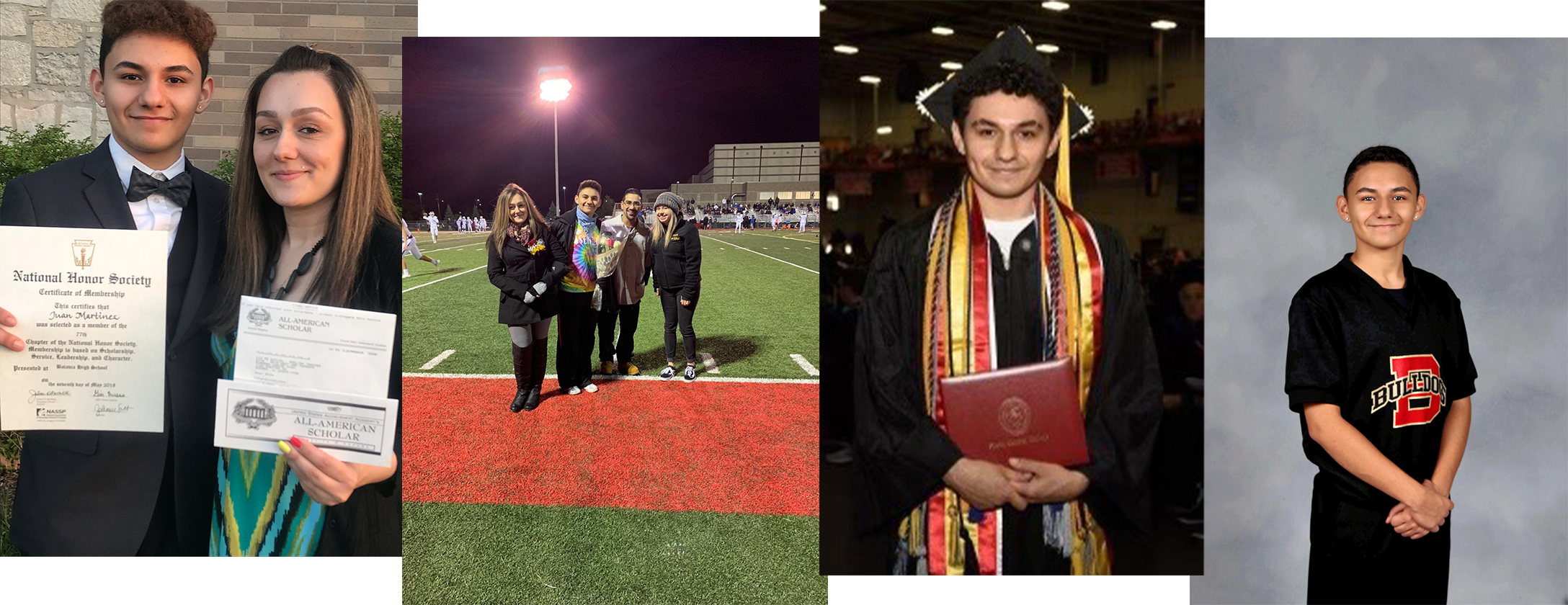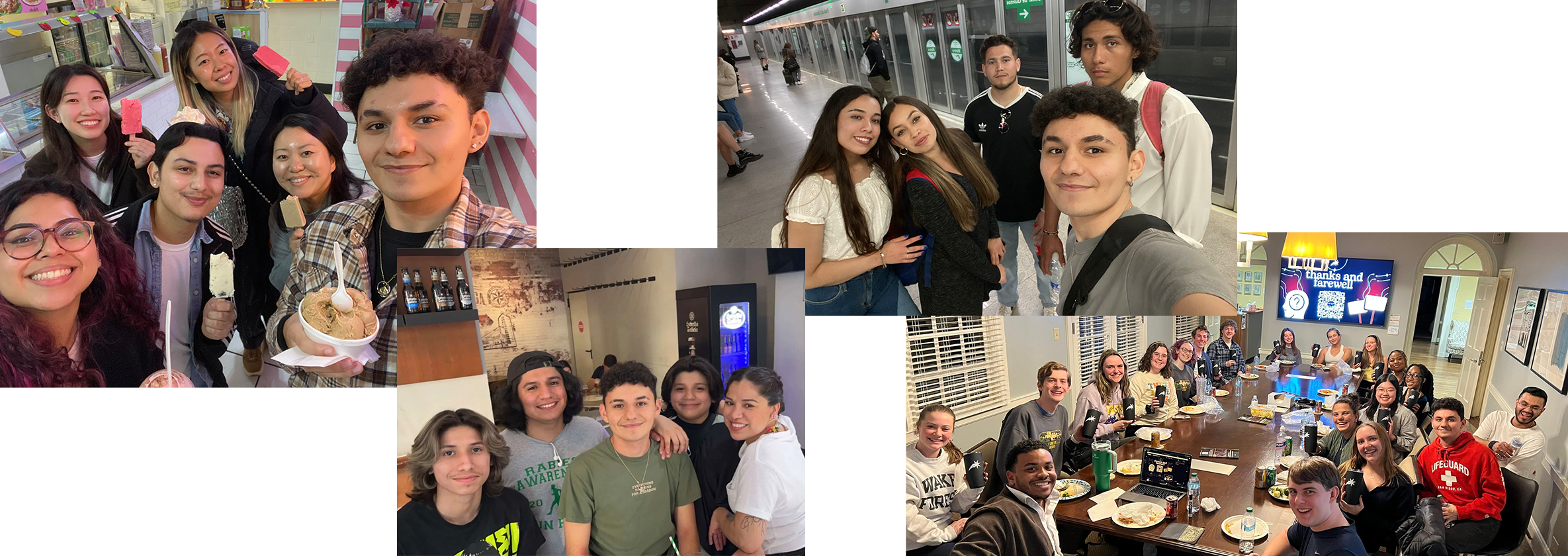The Courage to Unbecome
by Roscoe Bell (’23)
JJ Martinez (MSM ’25) never imagined himself at Wake Forest. So, when he received the Wells Fargo Inclusive Excellence Scholarship at the School of Business, it felt surreal. Arriving on campus with his family and friends, JJ was teary-eyed, gazing at manicured lawns and fire pits – a world that once seemed impossibly distant, almost like a movie. Back home, bullet holes riddled the walls of family homes, and people lived in fear – waiting not for internship offers but for the calm after a shooting and for the reassurance that a loved one still breathes.
“I shouldn’t be here,” JJ said. People like me don’t make it here. I’m a statistical outlier. By the metrics, I shouldn’t be here – but I am.”
As the Program Coordinator for the Program for Leadership and Character, I host bi-weekly Wednesday Night Dinners where we convene and converse about a specific topic. These dinners are alive with warm conversation, pockets of students sharing reflections, laughter, and food. During one of these Wednesday dinners, when we were talking about friendship, I met JJ Martinez.
He walked in late, dressed in a black suit and tie despite the dinner’s casual feel. After he grabbed some food and found a seat, he listened. Near the end of the session, JJ raised his hand. As he began to speak about friendship, the energy in the room shifted. He spoke of growing up amidst gang-affected communities, a world where violence and safety coexist as contradictions. Then, he turned the lens inward and then outward again, guiding us toward an insight: that true friendship – and by extension, true community – requires awareness of ourselves. And that awareness, he implied, demands an undoing, a willingness to “unbecome.”
When we think about what it means to “unbecome,” our minds might drift toward losing face or unraveling comfortable illusions. JJ suggested something deeper: to deliberately shed the biases, stereotypes, and stigmas that cling to us, to confront the preconceived notions of who belongs where, of what is “normal” and what is “right.”
For JJ, unbecoming meant surrendering the script that says certain lives have predictable trajectories, certain minds have no place at elite tables, certain stories do not matter. It means prying open cramped definitions that keep people – like him – confined to narrow futures. It means untangling the logic that lets us tolerate injustice, sorting through the messy remnants of pride and prejudice. It’s a deliberate act of self-definition and moral courage, and a renunciation of the easy answers that lock so many doors.
“My becoming is my unbecoming,” JJ said. And suddenly, it all clicked. Friendship, JJ implied, is a mirror, but only if we are willing to wipe away the dust of old judgments, polish it, and see who stands before us. His words were an invitation to us in the room and to those across Wake Forest’s campus:
“Who could we become, or befriend, if we dared to unbecome what we think we know?”
A Divided Upbringing
JJ’s story began in Illinois along the Fox River, connecting Batavia and Aurora, two cities bound by water but pulsing with different energies. Batavia, known for its strong public schools and predominantly white demographic, offered opportunities that helped JJ grow – such as free access to sports for low-income students and the eventual nomination that allowed him to apply for a full-ride scholarship. Yet Batavia could also feel profoundly isolating for a child with a tanner complexion and curly hair, neither of which fit the community’s unspoken norm of porcelain skin and straight hair.

“I was different,” JJ recalls.
He remembers blowing out his curls each morning, trying to blend in. He remembers high school hallways echoing with deportation jokes, never mind that he was born here. These dissonant moments – amid genuine support from teachers and administrators who recognized his promise – etched into him both the pressure and the possibility of navigating a predominantly white space. Batavia watered his ambitions but never fully reflected his family’s lived realities.
Across the Fox River was Aurora – alive, awake, ablaze with cultural vibrancy. Historically an industrial hub that drew diverse immigrant families seeking manufacturing work, Aurora later suffered from economic shifts and disinvestment. Redlined neighborhoods and decades of policy neglect left these communities struggling against structural hurdles. Yet Aurora’s complexity endures: the Spanish language soared through corner store doorways, and families, though underserved, remained hardworking, forging layered cultural mosaics in the face of systemic inequity.
JJ’s father, a native of the town, had gone to prison when JJ was very young. Hoping for steadier opportunities, JJ’s mother made an “active choice” to move to Batavia. While some locals unfairly labeled his subsidized housing complex as dangerous, JJ’s experiences there were defined more by lingering threats and fears than by direct confrontations. What did feel dangerous, however, was the financial stress of poverty. College often seemed like a distant dream because poverty narrowed one’s sense of possibility.
Meanwhile, JJ saw in Aurora how people sometimes joined gangs out of dire need to help pay rent, afford everyday necessities, or protect themselves in under-resourced schools. He recalls the story of a friend who tried to leave a gang – an act more treacherous than joining one – only to have a loved one killed in retaliation. The weight of that memory still lingers for JJ, reminding him that such tragedies are not random but born of a world offering too few off-ramps, too few second chances.
At this time in his life, he carried these narratives as truths, never fully realizing how deeply they shaped his ideas about who belonged where. Only later, after the door to higher education cracked open, would he see these limiting beliefs were not permanent fixtures but learned responses to a broken system.
Creating Opportunities that Challenge Limitations
Waubonsee Community College was where JJ’s trajectory began to bend. A full-ride scholarship opened a door on which he hadn’t dared to knock.
“The only moment I withdrew from believing in education was when I thought it wasn’t possible.”
At Waubonsee, JJ maintained a perfect 4.0 GPA and engaged deeply in campus life. Where he once kept silent about key aspects of his identity, Waubonsee embraced students from a range of backgrounds. With Latinos Unidos, he encountered conversations like “how not to contribute to harmful immigration policies” – an impossible topic back in his hometown.
Instead of silence, he found words. Instead of complacency, he found action. Instead of rigid roles, he found ways to challenge frameworks that insisted that only certain bodies fit the mold of success. JJ began to realize the narratives he’d long carried were not inevitable truths. That education shattered the limitations that seemed set in stone, allowing JJ to begin claiming authority over his own narrative. And in doing so, he discovered that he, too, had the power to shape the world around him.

Reconstructing Narratives and Self-Knowledge
After Waubonsee, JJ continued to North Central College. Though still predominantly white, this next step offered a crucial intellectual toolkit. A class in “critical whiteness studies” crystallized what he had sensed: that racism, exclusion, and inequity are not accidental but engineered. Zip codes determine educational destinies, and inherited stereotypes keep certain groups forever on the margins.
This was more than classroom theory. JJ’s honors thesis demonstrated that students with marginalized identities reported lower belonging and, as a result, lower GPAs, even controlling for socioeconomic status.
“It was a love letter to myself,” he said, proof that he wasn’t imagining these disparities.
With each insight, he further unbecame the narratives he once internalized. Now he had language to describe how prejudice forms the architecture of our institutions – and how assumptions about who “belongs” are passed along. Unbecoming meant confronting these assumptions head-on and choosing to dismantle them, piece by piece, for himself and for others yet to find their voice.
A Stage for Transformation
JJ understandably entered Wake Forest with apprehension – given years of navigating differences between those who shared his background and those who did not – but has been met with solid reassurance, receiving support from his program, University community, and friends alike.
“I realized there are people who want to help and support, even if I cannot offer something directly in return,” JJ says.
JJ has also built a solid foundation of mentors who continually send resources and reminders about opportunities. They connect him with like-minded individuals and celebrate his differences. They apologize if they say something accidentally hurtful – and these small gestures mean a great deal to him.
In each of these affirming moments, he is sent another message: You have a place. You matter. You belong. However, he emphasizes that he still struggles to believe this at times, because remnants of narratives telling him he does not belong linger in subtle ways – especially when faced with words or actions that may wound, intentionally or not.
In classrooms, he wrestles with conceptual examples that do not reflect his lived experiences; in business simulation projects, he sees overt exclusions of the very programs that once supported him and his family. Most Wake Foresters have never felt the repercussions of poverty or gang violence; these simply are not the cards they’ve been dealt, and so they struggle to relate. Although he feels empowered to give back to his communities so others may have the same chance he did, the path of a trailblazer can be solitary and have very lonely seasons.
But JJ is finding spaces of belonging. He serves on the MSM Student Engagement Council, works on LGBTQ+ Center programming, advocates for ethical leadership as a Program for Leadership and Character Ambassador, and thrives within social circles of his graduate school cohort. He is also expanding his honors thesis on belonging into an independent study – an endeavor he’s deeply proud of. He hopes to spark conversations within the business school and beyond, and early signs of his impact are already visible. Through searching dialogues, and the company of curious friends, JJ is deepening his footprint and finding another home.

Widening The Lens of Pro Humanitate
This journey of transformation reminds us that Pro Humanitate must ring true for everyone. Who is this ‘humanitate’ for? Can it stretch to encompass a young man who once believed college was out of reach, who felt prestige was never welcoming, who watched loved ones navigate worlds that people pretend do not exist?
When scholarships and support initiatives are properly directed, they can tell a different story – that this community is willing to unbecome its old boundaries, to expand its view of humanity, and to invite voices long absent from the table.
“My becoming is my unbecoming,” JJ says.
He once believed he didn’t belong, now he is at Wake Forest proving that each of us can break open the mold. To the marginalized students, JJ’s life whispers: you are enough, just as you are, and those curls – once blown straight for acceptance – are now a banner of pride. And for students poised to step into a world too often governed by stale assumptions, JJ’s story is a reminder: with your education, you possess an extraordinary capacity to challenge old boundaries, to shape new narratives, and to bring forth a more just and expansive vision of what we can be.
That is how Pro Humanitate moves from motto to practice.
JJ Martinez is enrolled in the Master of Science in Management program at the Wake Forest University School of Business. He will graduate in May 2025. He is the recipient of the Wells Fargo Scholars Program.
Roscoe Bell is a 2023 graduate of Wake Forest University. He serves as the Program Coordinator for the Program for Leadership and Character. As a student, he was a recipient of the Adelaide Alexander Sink Scholarship, the Christian Cappelluti Memorial Scholarship, the Carl and Lucille Harris Fund for the Department of Music, the M. Elizabeth Harris Music Scholarship and the Porter B. Byrum Scholarship. He will enter the Wake Forest School of Medicine in July 2025 as the recipient of the Dean’s Medical Excellence Scholarship.
